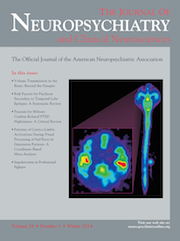Long-Term Duloxetine Withdrawal Syndrome and Management in a Depressed Patient
To the Editor: Serotonin and norepinephrine reuptake inhibitors (SNRIs), such as venlafaxine,1 have been reported to be associated with withdrawal syndromes. However, duloxetine-related withdrawal syndrome is infrequently mentioned. We want to report on a depressed patient who experienced a long-term duloxetine withdrawal syndrome and relief after gradual tapering procedures.
Case Report
“Miss B” was a depressed patient (depressed mood, anhedonia, anergia, binge eating, and suicide ideation) with partial remission of symptoms under duloxetine treatment (60 mg/day) for 1 year. However, she disliked the side effects of duloxetine (dizziness and sedation). Therefore, duloxetine was abruptly switched to bupropion 150 mg/day. She started to feel more energy, but with intermittent severe nausea, unexplained fear, and dizziness after quitting duloxetine for 1 day. She still had withdrawal symptoms once-to-twice every week in the following 6 months after the switch. She took duloxetine 30 mg only while feeling withdrawal discomfort in the next 3 months, and then took 15 mg (discarding half the dose of the 30-mg capsule) in the same way for the last month. She took 10 months to recover from long-term and intermittent duloxetine withdrawal syndrome. No residual withdrawal syndrome was noted since that time.
Discussion
Venlafaxine has a higher selectivity of serotonin receptor (30-fold versus norepinephrine) than duloxetine (10-fold).2 Perahia et al. reported that discontinuation-emergent adverse effects of duloxetine happened in around 44.3% of patients, versus 22.9% in a placebo group. They found that duloxetine withdrawal syndrome included dizziness, nausea, headache, paresthesia, vomiting, irritability, and nightmares,3 which were similar to the symptoms of this patient. Duloxetine withdrawal syndrome is similar to that seen in discontinuation of SNRIs and serotoninergic-related antidepressants.3 A 10-fold selectivity for serotonin receptor of duloxetine might explain duloxetine withdrawal syndrome in this patient and why it is not so frequent as with venlafaxine, which has 30-fold higher affinity.2 In a current literature search, duloxetine withdrawal syndrome is just mentioned in a few reports.3,4 Besides, a relatively longer half-life of duloxetine (12 hours)5 than the short half-life (5 hours) of venlafaxine,6 and possible genotype polymorphism of Asian people,6 might explain why the long-term and intermittent duloxetine withdrawal syndrome happened in this patient. A gradual tapering-down of duloxetine dose (not an abrupt switch) or occasional re-use of duloxetine while withdrawing might be helpful for this kind of long-term duloxetine withdrawal syndrome.
1 : Withdrawal syndrome after discontinuation of venlafaxine. Am J Psychiatry 1997; 154:1473–1474Crossref, Medline, Google Scholar
2 : Tolerability of serotonin norepinephrine reuptake inhibitor antidepressants. CNS Spectr 2008; 13(Suppl 11):27–33Crossref, Medline, Google Scholar
3 : Symptoms following abrupt discontinuation of duloxetine treatment in patients with major depressive disorder. J Affect Disord 2005; 89:207–212Crossref, Medline, Google Scholar
4 : Duloxetine withdrawal syndrome in a newborn. Clin Pediatr (Phila) 2012; 52:976–977Crossref, Medline, Google Scholar
5 : Duloxetine: a review of its use in the treatment of generalized anxiety disorder. CNS Drugs 2009; 23:523–541Crossref, Medline, Google Scholar
6 : Venlafaxine withdrawal syndrome: report of seven cases in Trinidad. J Clin Psychopharmacol 2004; 24:229–231Crossref, Medline, Google Scholar



